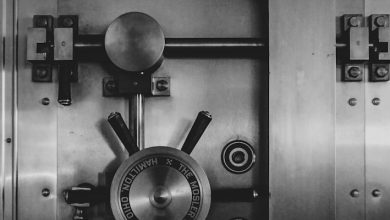How to Safely Store Your Cryptocurrency: Best Practices

- Understanding the risks of storing cryptocurrency
- Choosing the right type of wallet for your needs
- Setting up two-factor authentication for added security
- Backing up your wallet and private keys
- Protecting against malware and phishing attacks
- Diversifying your storage solutions for added protection
Understanding the risks of storing cryptocurrency
When it comes to storing cryptocurrency, it is important to understand the risks involved. One of the main risks is the potential for hacking and theft. Since cryptocurrency transactions are irreversible, once your funds are stolen, they are gone for good. Another risk to consider is the volatility of the market. Cryptocurrency prices can fluctuate wildly in a short period, which could result in a loss of value for your stored assets.
Additionally, there is the risk of losing access to your cryptocurrency due to technical issues or human error. If you forget your private keys or passwords, or if your hardware wallet malfunctions, you could permanently lose access to your funds. It is crucial to take precautions to ensure that you can always access and recover your cryptocurrency in case of an emergency.
Furthermore, there is the risk of regulatory changes and government intervention. Cryptocurrency regulations vary by country, and governments may impose restrictions or bans on the use of digital assets. This could impact the value of your cryptocurrency holdings and limit your ability to transact freely.
Overall, it is essential to be aware of these risks and take steps to mitigate them. By using secure storage methods, keeping your private keys safe, and staying informed about market developments, you can protect your cryptocurrency investments and minimize the chances of loss or theft.
Choosing the right type of wallet for your needs
When it comes to safely storing your cryptocurrency, choosing the right type of wallet is crucial. There are several options available, each with its own set of features and security measures. It’s important to assess your needs and preferences before deciding on a wallet type.
One option is a hardware wallet, which is considered one of the most secure ways to store cryptocurrency. These wallets store your private keys offline, making them less vulnerable to hacking or cyber attacks. While hardware wallets may come at a higher cost, the added security they provide is well worth the investment.
Another option is a software wallet, which can be either a desktop, mobile, or online wallet. These wallets are convenient and easy to use, but may not offer the same level of security as hardware wallets. It’s important to choose a reputable software wallet provider and enable two-factor authentication for added security.
Paper wallets are another secure way to store cryptocurrency, as they involve printing out your private keys and keeping them in a safe place. However, paper wallets can be easily lost or damaged, so it’s important to take extra precautions when using this method.
Ultimately, the best type of wallet for your needs will depend on your individual preferences and risk tolerance. It’s important to do your research and choose a wallet that offers the right balance of security and convenience for you. Remember to regularly back up your wallet and keep your private keys secure to protect your cryptocurrency assets.
Setting up two-factor authentication for added security
For added security when storing your cryptocurrency, it is highly recommended to set up two-factor authentication (2FA) on your accounts. Two-factor authentication adds an extra layer of protection by requiring not only your password but also a second piece of information to verify your identity.
To enable two-factor authentication, you typically need to download an authenticator app on your smartphone, such as Google Authenticator or Authy. Once you have the app installed, you can link it to your cryptocurrency exchange account. From there, whenever you log in, you will be prompted to enter a unique code generated by the authenticator app.
By using two-factor authentication, you greatly reduce the risk of unauthorized access to your cryptocurrency holdings. Even if someone manages to obtain your password, they would still need access to your smartphone to generate the secondary code, making it much more challenging for hackers to breach your account.
Backing up your wallet and private keys
One crucial step in securely storing your cryptocurrency is backing up your wallet and private keys. This is essential in case of any unexpected events like losing your device or experiencing a technical failure. By following these best practices, you can ensure that your digital assets are safe and accessible when you need them.
One way to back up your wallet is by creating a secure offline storage solution, such as a hardware wallet or a paper wallet. These options allow you to store your private keys in a physical form that is not connected to the internet, reducing the risk of hacking or theft.
Another method is to encrypt your wallet file and store it in a secure cloud storage service. Make sure to use a strong password and enable two-factor authentication for an added layer of security. This way, you can access your wallet from anywhere in the world, as long as you have an internet connection.
It is also recommended to regularly back up your wallet and private keys in multiple locations. This redundancy can help prevent data loss in case one of your backup methods fails. Consider storing copies of your backups in a safe deposit box, a trusted friend’s house, or a secure digital storage service.
Remember to test your backups periodically to ensure they are working correctly. This can help you avoid any issues when you need to restore your wallet in the future. By following these best practices for backing up your wallet and private keys, you can have peace of mind knowing that your cryptocurrency is safe and secure.
Protecting against malware and phishing attacks
Protecting your cryptocurrency against malware and phishing attacks is crucial to ensure the security of your digital assets. Malware can infiltrate your devices and steal your private keys, while phishing attacks can trick you into revealing sensitive information. Here are some best practices to safeguard your cryptocurrency:
- Use a reliable antivirus program: Install a reputable antivirus program on all your devices to detect and remove any malware that may compromise your security.
- Enable two-factor authentication: Adding an extra layer of security with two-factor authentication can help prevent unauthorized access to your cryptocurrency wallets.
- Be cautious of suspicious emails: Avoid clicking on links or downloading attachments from unknown senders, as they may contain malware or phishing attempts.
- Keep your software up to date: Regularly update your operating system, software, and wallets to patch any vulnerabilities that hackers could exploit.
- Use a hardware wallet: Consider storing the majority of your cryptocurrency in a hardware wallet, which is an offline device that provides extra security against online threats.
By following these best practices, you can minimize the risk of falling victim to malware and phishing attacks, and keep your cryptocurrency safe and secure.
Diversifying your storage solutions for added protection
Another important aspect of safely storing your cryptocurrency is to diversify your storage solutions for added protection. Relying on a single storage method can be risky, as it leaves you vulnerable to various risks such as hacking or technical failures. By diversifying your storage solutions, you can spread out the risk and enhance the security of your digital assets.
One way to diversify your storage solutions is to use a combination of hardware wallets, paper wallets, and secure online wallets. Hardware wallets are physical devices that store your cryptocurrency offline, making them less susceptible to hacking. Paper wallets involve printing out your private keys and storing them in a secure location, away from potential online threats. Secure online wallets offer convenience for accessing your funds while still providing a layer of security.
By using a combination of these storage methods, you can minimize the risk of losing your cryptocurrency due to a single point of failure. Additionally, regularly backing up your wallets and keeping them up to date with the latest security measures can further enhance the protection of your digital assets.



